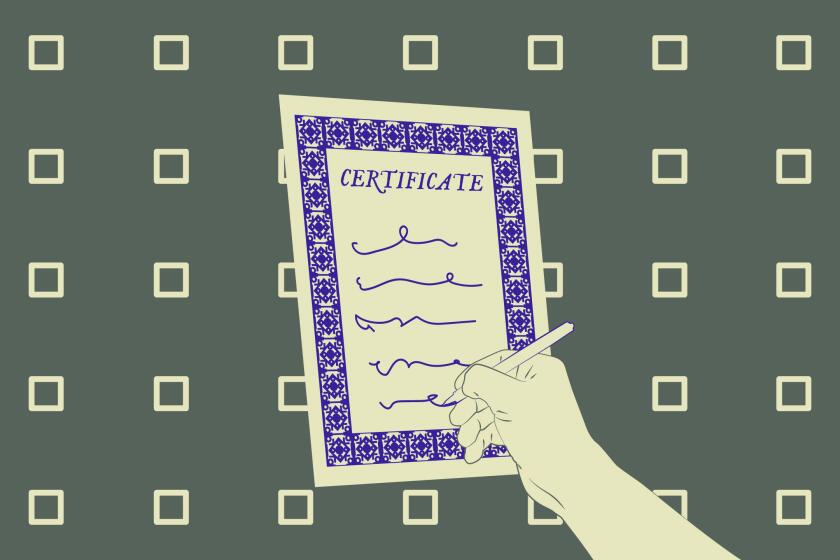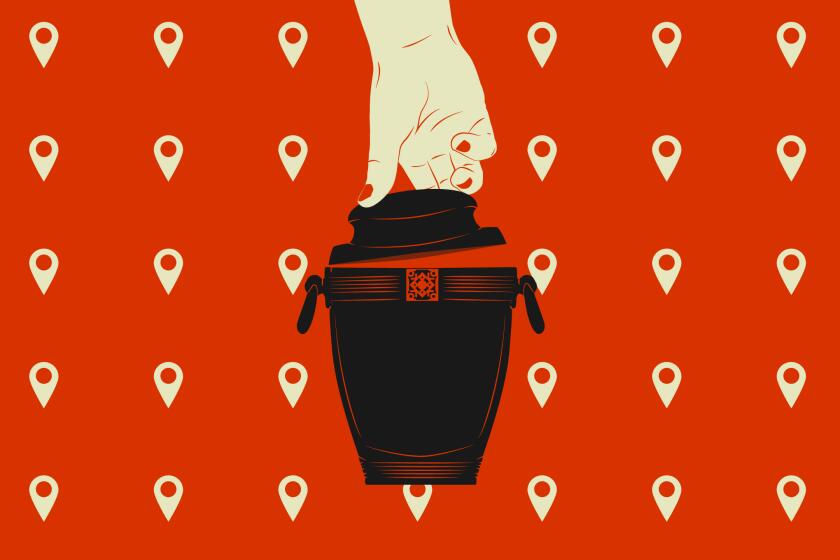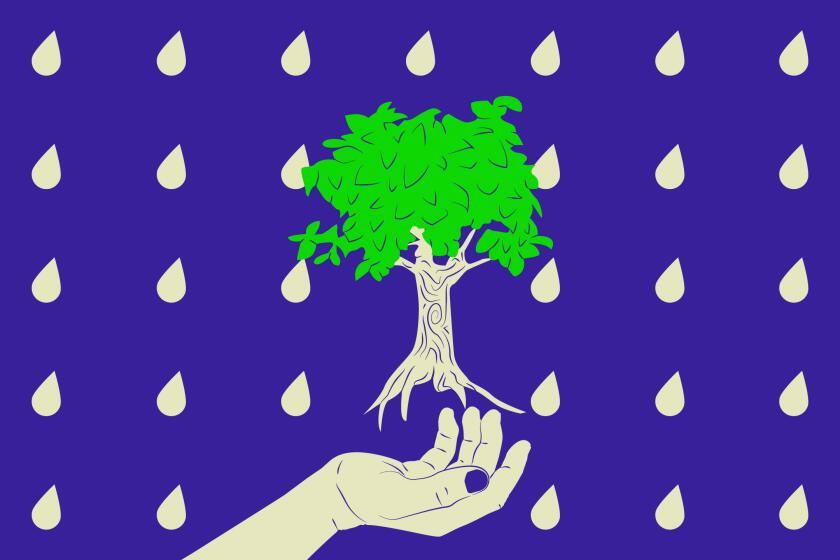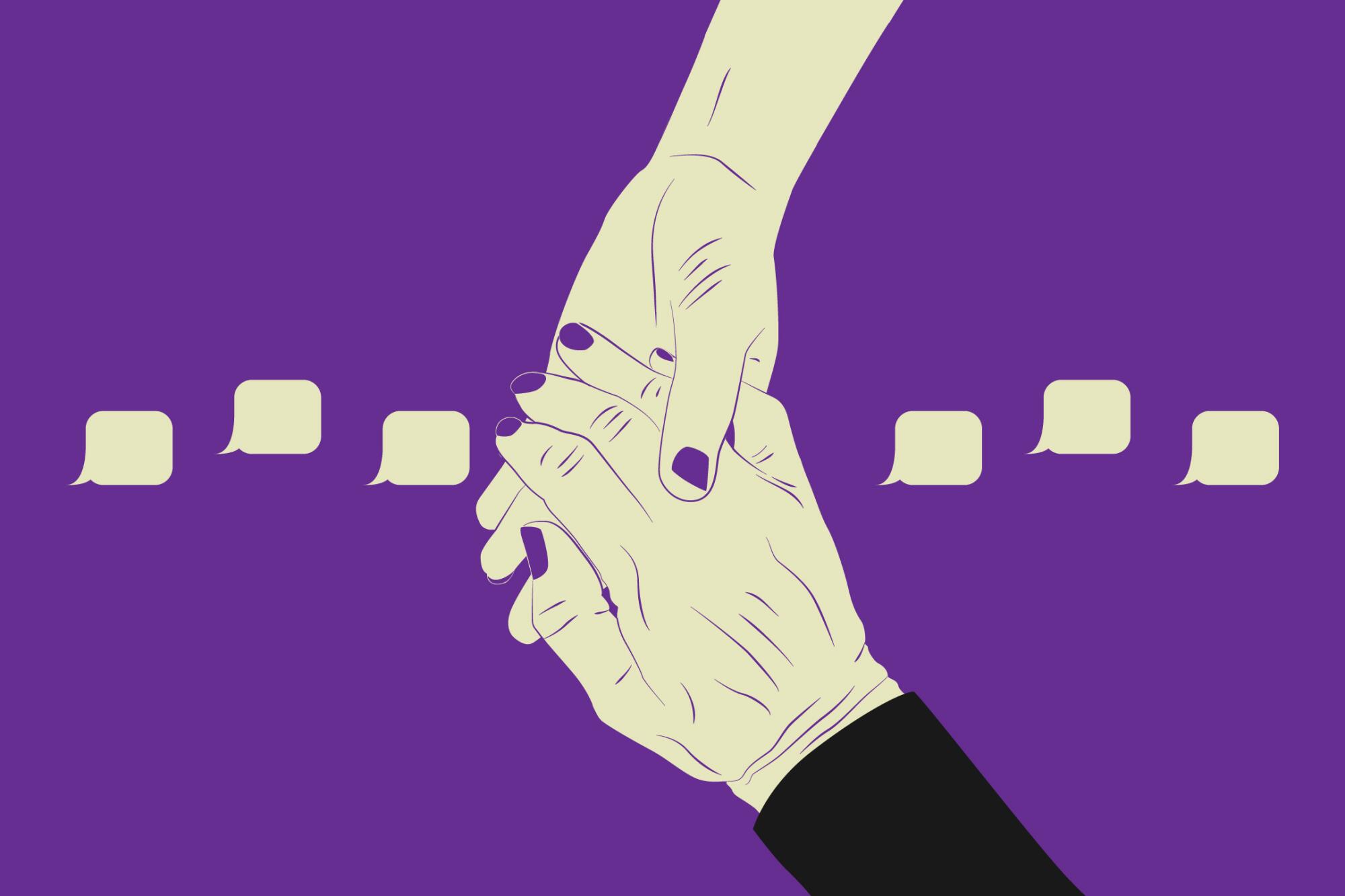
- Share via
Amy Pickard wants you to talk about death. Specifically, she wants you to make your healthcare planning and end-of-life arrangements known to your loved ones.
She knows that talking about death is going to make most people squirm. But the Southern Californian, who runs the end-of-life consulting company Good to Go!, says an awkward but respectful conversation now lessens the grief of a loss when the inevitable happens and allows people to honor a deceased loved one’s wishes.
“I tell adult children to tell their parents, ‘Hey, I’m getting organized with all my advance planning, and I just realized that if I don’t know what I want, you guys certainly wouldn’t know,’” she said. “‘And then I thought if something happens to you guys, I wouldn’t have a clue what to do, and that terrifies me.’”
But why is it so difficult for adults to talk about death?
For some people, it comes from a fear of dying, said author Cameron Huddleston. She said having to talk about end-of-life arrangements feels like being forced to think about mortality.
When she was working on her book “Mom and Dad, We Need to Talk: How to Have Essential Conversations With Your Parents About Their Finances,” Huddleston found that these conversations also make people feel like their time will be up sooner rather than later.
“However, avoiding the subject doesn’t mean you can avoid the inevitable,” she said. “It just means that you probably won’t have a plan for your death, and you’ll make things harder for those you leave behind.”
When someone you care for dies unexpectedly, many responsibilities will fall onto your shoulders. Here’s a guide to what they are and how to handle them.
Why we need the death talk
Pickard and other advocates for end-of-life planning find that sharing their personal experiences helps normalize the conversation. Pickard discusses with clients her experience of grieving the loss of her mother, who died unexpectedly at age 67.
“So I’m in the wilderness of grief, and at the same time I had to suddenly be an accountant, a florist, a detective, a travel agent, an estate appraiser and just all these things. And I was none of those things,” she said.
Her mom didn’t leave any instructions or wishes. Pickard described the work of wrapping up her mother’s life as overwhelming emotional labor.
In the midst of grieving a parent’s death, you might also have to plan the memorial, deal with their finances, end monthly magazine subscriptions and notify others of their death. It’s not easy to juggle these tasks or final wishes if you don’t know what someone wants or where their information is stored.
That’s compounding grief with tasks that are frustrating at the best of times. To avoid it, you’ll have to have a difficult conversation that a parent might not be ready for. Asking if your parent would prefer to be buried or cremated (or something else entirely) could elicit responses like “I’m not that old” or “Why, are you trying to get rid of me?” No, you aren’t, but you can’t be their advocate without knowing what they want.
“It’s OK to acknowledge that the topic is uncomfortable, but you could say that you would be even more uncomfortable making arrangements for them without their input,” Huddleston said.
What do you do when someone dies?
Because we find death so hard to talk about, there are probably lots of things people wonder but don’t know. We have answers.
Not having a parent’s healthcare wishes and end-of-life instructions could leave a child wondering whether they made the right decisions.
It can also be an overwhelming experience to sort through a person’s belongings for information.
When Pickard’s mother died, she had no directions to follow. The minute she arrived at her mother’s condo in Chicago to cancel the utility bills and take care of other death duties, Pickard realized that she didn’t know the name of the electric company that kept the lights on.
“I would have given anything to talk to my mom again,” she said. “Not to tell her I loved her but to get her Wi-Fi password.”
At the end of the day, having this information at the ready allows people to focus on love, Pickard said — how much that person was loved and how much people loved them.
This future peace of mind extends to the person who made their end-of-life wishes known. Pickard says these instructions aren’t just mundane bill canceling. For an adult child, it can be the last time a mother, father or guardian takes care of them.
Huddleston added, “Think of letting your family know what your final wishes are as a gift — your final gift to them. You’ll make it easier for them during a difficult time by having a detailed plan that they can follow.”
L.A. is a complicated place to live. Does it have to be such a complicated place to scatter ashes after someone dies?
Starting the conversation
There isn’t one right way to approach this conversation. It really depends on whom you are talking with.
If you know your person doesn’t like to be taken by surprise, give them a heads up, said Kate DeBartolo of the Conversation Project, an initiative of the Institute for Healthcare Improvement. For example, DeBartolo said, if you’re planning a two-week visit with your parent(s), let them know beforehand that this topic is on your mind and that you would like to talk about it with them.
This gives the person the opportunity to think about what they want if they haven’t already.
You can sit down and talk about it over coffee or sprinkle it into everyday conversation when it feels natural.
If you’re watching a TV show or movie that depicts a funeral, that could prompt the conversation. You could say, “That made me realize I’m not sure of what you would want in that situation” or “Do you agree with the decision that character made for their parent?” DeBartolo said.
It could be a one-on-one conversation or it could be done with several people.
“I heard a woman who said she made desserts for her family at Thanksgiving and she held them all hostage and said, ‘No pumpkin pie until you tell me how you want to die,’” DeBartolo said. “And everybody would go around the table and talk about it, and that worked for her family.”
People are choosing eco-friendly and creative options for their final resting places, including the bottom of the ocean and miles and miles into outer space.
Having the conversation
Before you broach the subject, DeBartolo wants you to keep in mind the following:
- Your questions won’t be solved with one conversation. The more you discuss it, the easier it will be for someone to talk about it and share their thoughts.
- Don’t wait until the end of someone’s life to talk about their wishes. There’s a misconception that this conversation should happen with older adults. DeBartolo argues that everyone over 18 should get their arrangements in order or at least start talking about it. Keep in mind that the information will need to be updated whenever you move, get married, divorced or have a child.
- Don’t start the conversation with financial questions. You might give a person the wrong impression — that you only care about their money.
- Be an active listener. The person you’re talking with might not give you a straight answer. DeBartolo said a grandmother might say that she wants “home” to be a part of her end-of-life care. Ensuring that Grandmother is at home might not be feasible, but “home” could mean having home-cooked meals, living in a facility that allows her cat or having personal effects with her.
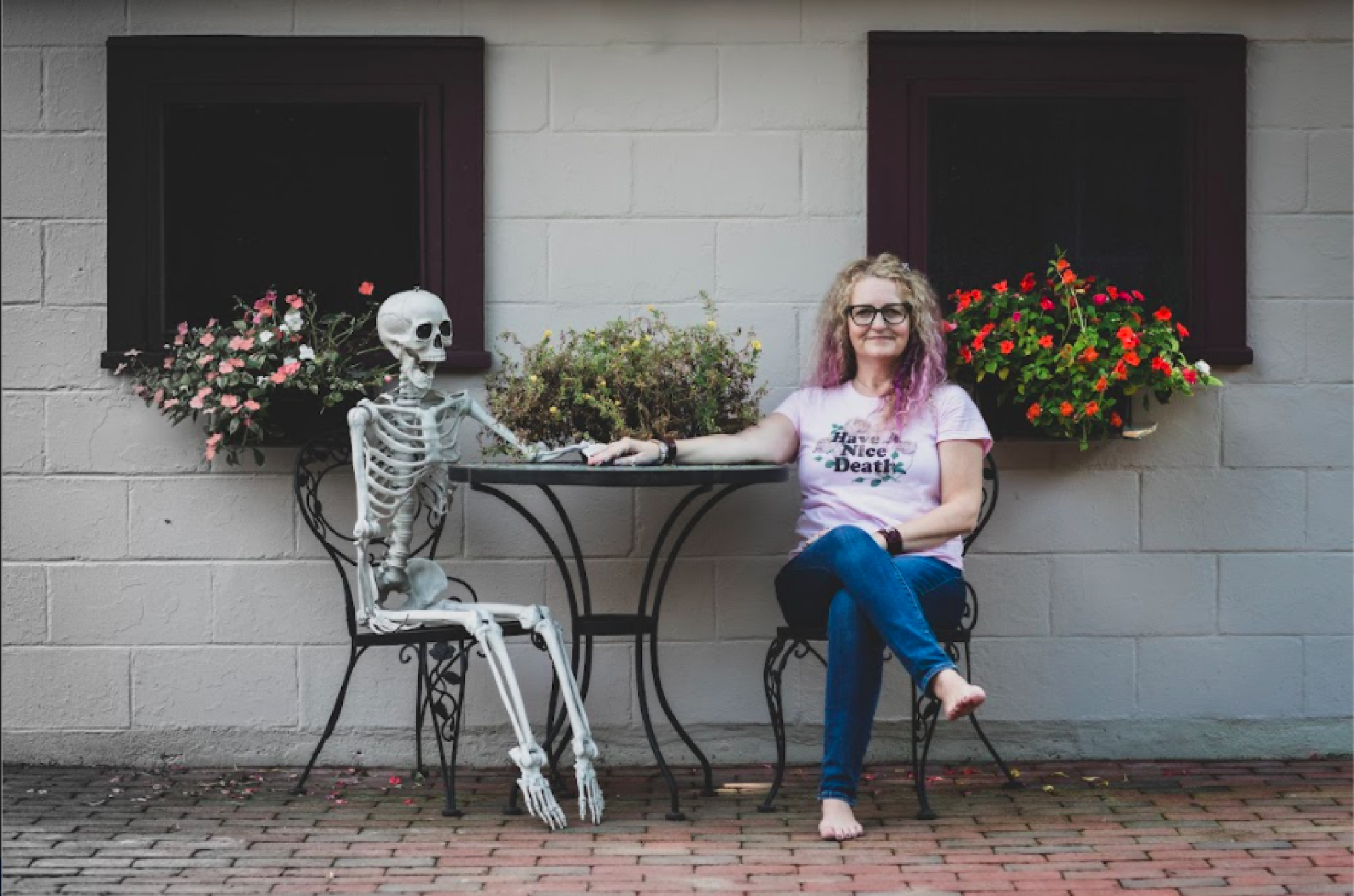
Lastly, when you’re ready to reach out to someone, remember to frame the conversation with compassion. This doesn’t have to be a painful talk, DeBartolo said. It can be loving, a time to share memories.
In the conversation, Huddleston said, find out the following information at the very least:
- How the person wants their remains handled. If burial is their choice, ask if a plot has been purchased or where they would prefer to be buried.
- What type of memorial service they want, including music choices and who will speak.
- The names and contact information of the people they would like to be notified of their death.
- Information for the obituary.
- The location of wills, trusts and any life insurance policy.
- A list of assets and accounts, including things like the names of their utility companies — and their computer login and Wi-Fi information.
- Any specific instructions for how they want heirs to handle their inheritance.
- Arrangements for children or pets.
Some people will never want to talk out loud about this, and DeBartolo said that’s OK too. Let them know you’re open to hearing how they’d like the end of their life handled in any way they feel comfortable communicating it. If they can send you an email or a text of a few instructions or tell you where their important documents are, that can be enough.
About half the U.S. population, including 18 million Californians, are registered organ donors. But whether you can actually donate organs depends on how you die, among other limiting factors.
Resources
The Conversation Project has a free starter guide and focuses on end-of-life healthcare.
Good to Go! sells a “departure file” and offers consulting services in a private or group setting. The latter is called “Good to Go! Parties,” an upbeat gathering to talk, eat, drink and fill out the departure files.
CaringInfo, a program of the National Hospice and Palliative Care Organization, has guides and resources to help clarify the difference between hospice and palliative care or what you need to create an advance directive.
International End-of-Life Doula Assn. has a directory of doulas who can assist with advanced-care planning.
Death Cafes, in person or online, are group-directed discussions of death with no agenda, objective or theme. It’s a discussion group and not grief support or counseling.
The California Office of the Attorney General has an end-of-life care checklist, resources including Medicare information, an advance healthcare directive checklist and more.
About The Times Utility Journalism Team
This article is from The Times’ Utility Journalism Team. Our mission is to be essential to the lives of Southern Californians by publishing information that solves problems, answers questions and helps with decision making. We serve audiences in and around Los Angeles — including current Times subscribers and diverse communities that haven’t historically had their needs met by our coverage.
How can we be useful to you and your community? Email utility (at) latimes.com or one of our journalists: Jon Healey, Ada Tseng, Jessica Roy and Karen Garcia.
More to Read
Sign up for The Wild
We’ll help you find the best places to hike, bike and run, as well as the perfect silent spots for meditation and yoga.
You may occasionally receive promotional content from the Los Angeles Times.
